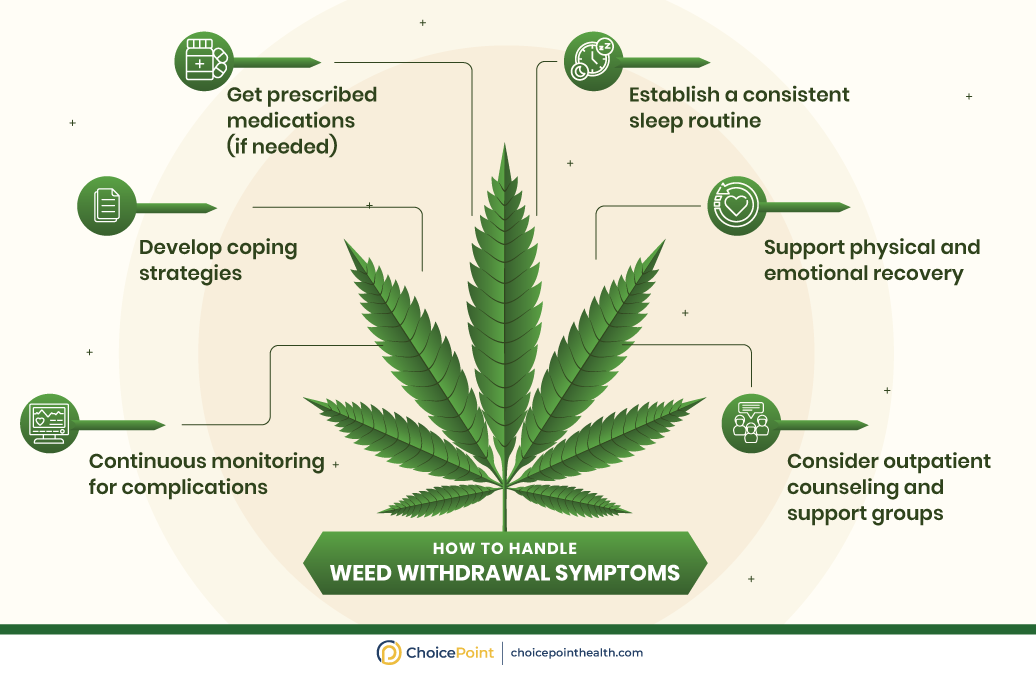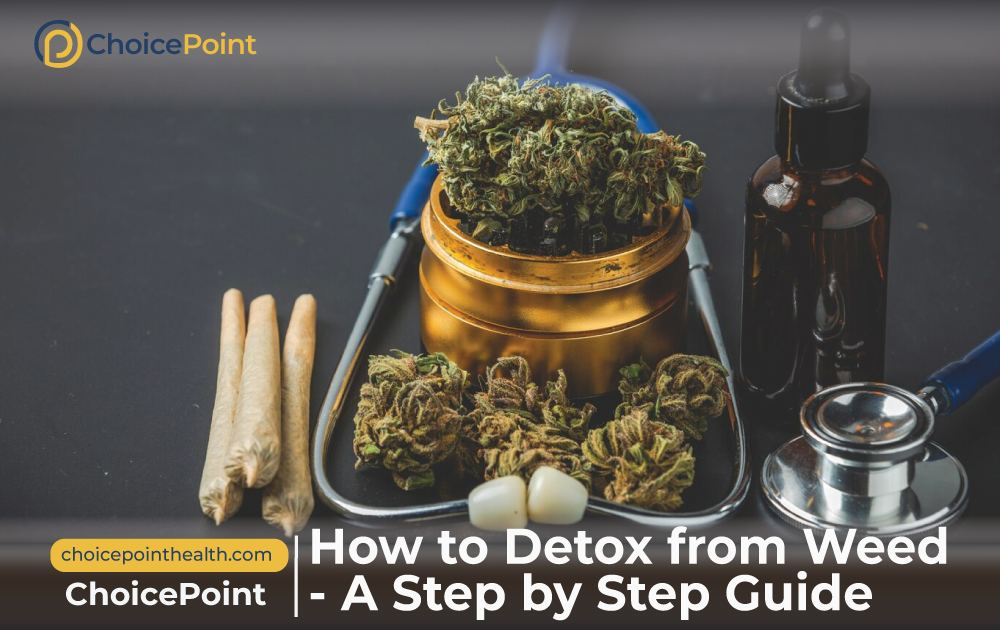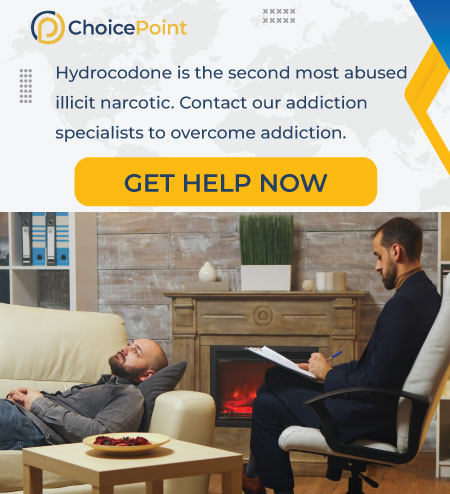Medically supervised psychiatric careAlmost 48.2 million Americans used weed at least once, and this number is growing each year. Although a majority of daily users wish to quit, heavy cannabis use can be very difficult to quit without support. Thankfully, supervised detoxification exists specifically to help people detox from weed in a safe, controlled setting. In this blog, we will guide you on how to detox from weed. We will also shed light on how long it takes to detox from weed and whether detoxing at home is a safe choice.
At ChoicePoint, we have personalized addiction program treatment for pregnant women, veterans, and even students. Call us now at 844.445.2563 and discuss the best action with our DEA-certified staff!
Table of Contents
Signs of Weed Addiction
Weed or Marijuana use may easily turn into an addiction for some people. Several red flags indicate when casual use has transitioned into a long-term dependency. One major sign is an inability to stop smoking weed even though it is interfering with important areas of life. People addicted to weed will continue using it even though it is negatively impacting their relationships, work or school performance, and financial situation. Other symptoms of weed addiction include;
- Increased tolerance to regular doses of weed
- Consuming more weed to get the same level of high
- Experiencing withdrawal symptoms when trying to quit
- May cause mild hallucinations after prolonged abuse
- Bloodshot eyes
- Increases in both blood pressure and heart rate

Did you know? that between 85% and 95% of drug users who entered a treatment program report remaining sober nine months later?

Did you know? that between 85% and 95% of drug users who entered a treatment program report remaining sober nine months later?
How to Detox from Weed at an Addiction Rehab-A Step by Step Guide
Addiction rehabs offer a comprehensive approach to treating weed addiction, which targets the complex roots and underlying behavior patterns. Additionally, individual and group behavioral therapies empower patients to resist cravings and avoid triggers. Counseling teaches healthier coping strategies to handle stress and underlying issues like trauma without misusing cannabis. Moreover, they offer patients FDA-approved medications to help them transition into a sober life. Here is how to detox from weed fast through a rehab center under the 24/7 supervision of a professional healthcare provider. Remember, the timeline may vary from case to case, depending upon the intensity of the addiction.
Step 1: Intake and Assessment
Initial steps include doctors conducting medical and mental health assessments. To tailor the detox treatment plan, this may include:
- a toxicity screen
- determining the history of use
- age
The patient may also be prescribed medications to ease certain withdrawal symptoms.
Step 2: Stabilization
The first 1-2 days focus on helping the patient become medically stable as the THC leaves their system. Monitoring vitals and addressing issues like electrolyte imbalances or nausea ensures the patient remains comfortable.
Step 3: Withdrawal Peak
Days 2-6 are often the peak withdrawal period for weed addiction. Anxiety, insomnia, appetite changes, and intense cravings may surface. Staff administers prescribed medications and alternative therapies like acupuncture or massage to alleviate distress during this difficult phase.
Step 4: Tapering Off
After withdrawal intensity subsides, any symptom management medications are gradually tapered off under medical guidance. This may continue till day 7 or until the patient achieves balance as withdrawal releases its grip.
Step 5: Transition to Treatment Program
With the toxins fully expelled from the body and physical symptoms alleviated, the patient can move forward from medical detox into addiction treatment. Consequently, they will be offered counseling for continued addiction recovery.

Did you know? that those addicted to weed also tend to spend excessive time and effort obtaining and using cannabis? They may even give up previous hobbies and social activities in favor of getting high. Despite promising themselves or loved ones that they will cut back or stop entirely, people addicted to marijuana repeatedly fail at their attempts to moderate or abstain from use.

Did you know? that those addicted to weed also tend to spend excessive time and effort obtaining and using cannabis? They may even give up previous hobbies and social activities in favor of getting high. Despite promising themselves or loved ones that they will cut back or stop entirely, people addicted to marijuana repeatedly fail at their attempts to moderate or abstain from use.
Use of Therapy and Counseling to Quit Weed
The biggest concern after knowing how to detox from weed is how to ensure any underlying disorders are professionally treated with counseling and medications. Licensed therapists and counselors provide cognitive-behavioral therapy (CBT), motivational enhancement therapy (MET), and contingency management to build patients’ resilience and healthy coping abilities.
Types of Therapy Available at Addiction Rehabs
Rehab centers offer a combination of carefully planned and executed therapies to offer the patients the best chance to recover. Listed below are some of the most popular types of therapies available;
Cognitive-Behavioral Therapy(CBT)
CBT helps identify problematic thought patterns leading to using behaviors and transforms them into healthier mindsets. CBT curbs cravings for weed and the false need for cannabis to handle life’s demands.
Dialectical Behavior Therapy(DBT)
To promote well-being, DBT helps patients learn to regulate emotions, recognize destructive behavior, and ignore cravings for drugs. Moreover, it also helps to gain control over thoughts and actions, manage anger, and prevent suicidal behavior.
Motivational Enhancement Therapy
Therapists use empathy to help patients see how their use of cannabis clashes with their values. Understanding this conflict makes patients more ready to make positive changes toward sobriety.
Contingency Management
Small incentives awarded for demonstrating sobriety are positive reinforcement for quitting. These rewards encourage people to follow their recovery plan and address deeper problems. Gradually, they find motivation from within themselves instead of relying on external rewards.
Group Therapy
Group sessions help people interact genuinely with each other, support one another, and solve problems together. This makes the recovery from the weed addiction process feel more normal. Moreover, it helps individuals believe in their ability to recover and be responsible for their progress.
Family Therapy
During family therapy sessions, the aim is to fix strained family relationships. This is achieved by involving family members in supporting sobriety. It helps create a positive environment for healing, both during and after formal treatment.
Are you struggling to fight reoccurring thoughts about drinking or doing drugs? Do you wish to begin online CBT or DBT to recover from substance use? Call us now at 844.445.2563 and schedule a Telehealth appointment!

Coping With Weed Withdrawal Symptoms
How Long Does It Take To Detox from Weed?
Now that we have discussed in detail how to detox from weed let’s take a look at how long it takes to detox from weed. The recovery timeline for cannabis addiction is highly variable based on individual circumstances, but it often takes a minimum of several months for a lasting change.
- Typically, the initial detox phase lasts around 5-7 days in a medically supervised inpatient setting.
- From there, patients move into a rehab therapeutic community for 1-3 months, focused intensively on behavioral therapies, relapse prevention planning, and aftercare.
- At least 3 months is needed to rewire addictive habits truly, thought patterns, and lifestyle behaviors.
- Yet, 90 days in treatment should be viewed as the starting line, not the finish line.
- The risk of relapse remains for 6-12 months as individuals navigate triggers and high-risk scenarios on their own after rehab.
Ultimately, recovering from addiction must embrace recovery as an ongoing lifelong process of personal growth and addiction management. With consistent self-care and professional aftercare, each year in recovery often gets progressively easier. However, avoiding the pull of addiction requires constant, conscious effort.
How to Detox from Weed at Home?
Some people claim that detox drinks can help flush THC from the system temporarily by diluting urine. However, results are not guaranteed, and the effectiveness may vary. Never take risks while detoxing from a harmful substance. Here are 3 reasons why detoxing from weed at home is not recommended:
- Less likely to be successful than a medical detox
- The underlying reason is left unaddressed, resulting in a relapse
- Quitting can cause severe withdrawal symptoms

Has it ever come to attention that some people try methods like cranberry juice, certain teas, or supplements to detox from weed? However, scientific evidence supporting the effectiveness of these home remedies is limited. It is important to seek professional advice!

Has it ever come to attention that some people try methods like cranberry juice, certain teas, or supplements to detox from weed? However, scientific evidence supporting the effectiveness of these home remedies is limited. It is important to seek professional advice!
Help Section for How to Detox from Weed
Below are the most asked questions about how to detox from weed fast.
Five Tips to Make Detoxing from Weed Easy On You?
Detoxing from weed is highly challenging. It requires constant support from close ones and constant monitoring from healthcare providers. Here are some tips:
- Drink as much water(and other liquids) as you can
- Take a hot bath to relieve physical pains and relax your mind
- Maintain a healthy diet
- Eliminate or reduce the use of caffeine
- Exercise regularly to improve your mood and physical health
How Long Does THC Stay in Your System?
The duration that THC (the active compound in marijuana) stays in your system varies based on factors like:
- Frequency of use
- Metabolism
- Body fat
- Age
Generally, it can be detected in urine for up to 30 days, but heavy users might test positive for longer.
Can I Detox from Weed in One Day?
Detoxing from weed in one day is not realistic for most people. THC metabolites take time to leave the body. However, certain strategies, like increased water intake and exercise, may help slightly expedite the process.
Are There Any Risks Associated with Detoxing from Weed?
Rapid detox methods or extreme measures, such as excessive water intake, can have risks, including electrolyte imbalances. It’s crucial to prioritize safety and consult a healthcare professional if you have concerns. Remember, the best approach for weed detox is the one your healthcare provider offers you.
Can I Use Over-the-counter Detox Kits?
Over-the-counter detox kits are available, but their efficacy is debatable. It’s essential to reach out to professional addiction specialists who offer medically supervised detox for the best results.
Can I Speed Up the Detox Process?
No! There is no foolproof method to speed up the detox process. It largely depends on individual factors. However, staying hydrated, exercising, and maintaining a healthy lifestyle may help.
Medical Disclaimer:
ChoicePoint aims to improve the quality of life for people struggling with substance use disorder and mental health issues. Our team of licensed medical professionals research, edit and review the content before publishing. However, this information is not intended to be a substitute for professional medical advice, diagnosis, or treatment. For medical advice please consult your physicians or ChoicePoint's qualified staff.










Review How to Detox from Weed-A Step by Step Guide.